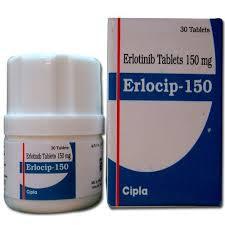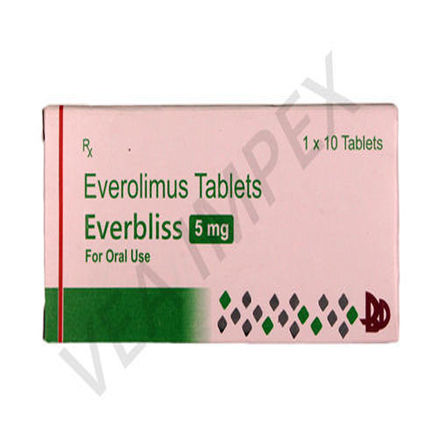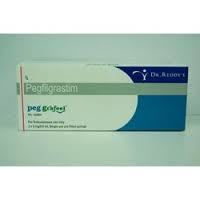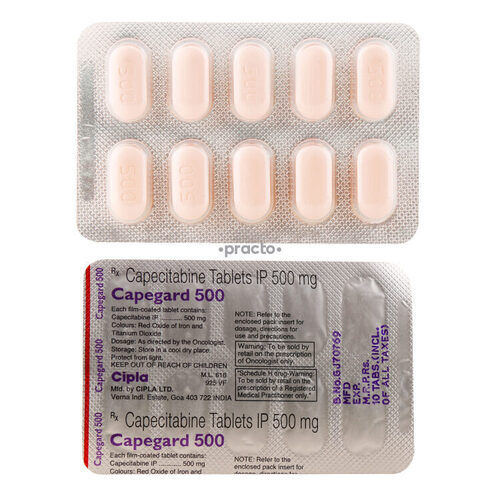
Erlocip Tablets
Product Details:
- Fermentation Smell Normal Smell
- Storage Instructions Cool And Dry
- Shelf Life 2 Years
- Click to view more
Erlocip Tablets Price And Quantity
- 5702 INR/Piece
- 5000-10000 Piece
- 10.00 - 100.00 INR/Piece
Erlocip Tablets Product Specifications
- Normal Smell
- 2 Years
- Cool And Dry
Erlocip Tablets Trade Information
- 10000 Piece Per Week
- 7-15 Days
- Asia Australia Central America North America South America Eastern Europe Western Europe Middle East Africa
- All India
Product Description
150 mg of Erlocip Tablets are used to treat specific forms of cancer and contain the active component erlotinib. A tyrosine kinase inhibitor called erlotinib stops the activity of aberrant proteins, which stops the growth of cancer cells. The pills should be swallowed whole, once day, on an empty stomach. The use of Erlocip 150mg is recommended for the treatment of pancreatic cancer that has metastasized to other body organs as well as metastatic non-small cell lung cancer (NSCLC). Rashes, diarrhoea, weariness, and decreased appetite are examples of typical adverse effects. Erlocip 150mg has demonstrated effectiveness in treating certain tumours, providing prospective advantages and better prognoses for cancer patients. During treatment, close medical care is required.
Erlocip Tablet Characteristics:
1. Erlotinib, a tyrosine kinase inhibitor that specifically targets certain cancer cells, is the active ingredient in the tablets.
2. Erlocip Tablets 150 are used to treat metastatic non-small cell lung cancer (NSCLC) and pancreatic cancer that has metastasized to other organ systems.
3. The tablets are administered orally, offering a practical and non-intrusive means of drug delivery.
4. Erlocip is often given once daily, which simplifies the patient's treatment schedule.
5. Erlotinib selectively inhibits aberrant proteins associated in the development of cancer cells, enabling focused therapy.
Erlocip Tablets 150 Benefits
1. Erlocip 150mg has shown success in the treatment of metastatic NSCLC and pancreatic cancer, potentially providing advantages and better results for people with these particular cancers.
2. Erlotinib therapy may result in tumour regression or stabilisation, which aids in the regulation of cancer growth.
3. Increased Survival Rates: The use of the drug erlocip has been linked to improved survival rates in some individuals with pancreatic and advanced NSCLC.
4. Erlocip 150mg can prevent the spread of cancer and slow the progression of certain diseases in people with metastatic cancer.
5. Enhanced Quality of Life: Erlocip can enhance the quality of life for cancer patients by reducing the symptoms and progress of their tumours.
6. Treatment plans are made specifically for each patient, taking into account their unique cancer kind, stage, and general health status.
7. Erlocip may be administered as adjuvant therapy following surgery or as neoadjuvant therapy before to surgery to enhance therapeutic results.
8. Potential for Disease Remission: Cancer treatment with Erlocip occasionally results in partial or total remission.
9. Erlocip is generally well tolerated, with the majority of patients reporting mild side effects.
It is important to remember that reactions to Erlocip Tablets 150 may differ from person to person. To manage potential side effects and improve treatment outcomes, close medical supervision and monitoring are required. Throughout the course of treatment, patients should speak with their medical specialists for personalised counsel and direction.
Erlocip Tablet Uses:
The following conditions are treated with Erlocip Tablets, which contain the active component erlotinib:
1. Erlocip is authorised for the treatment of locally progressed or metastatic non-small cell lung cancer (NSCLC) with particular genetic alterations, such as exon 19 deletions of the epidermal growth factor receptor (EGFR) or exon 21 (L858R) substitution mutations.
2. Erlocip and gemcitabine are combined for the treatment of advanced pancreatic cancer that cannot be removed surgically or has spread to other body parts.
Erlocip Tablets' Side Effects Include:
1. Erlocip is often tolerated well, although some people may develop side effects. Erlocip side effects frequently reported include:
2. Skin Rash: A typical side effect that can be treated with the right care is skin rash or itching.
3. Diarrhoea: Some people may experience gastrointestinal side effects, such as diarrhoea.
4. Weakness and weariness are possible side effects for patients.
5. Some patients may develop nausea and vomiting while receiving therapy.
6. Reduced Appetite: Erlocip therapy may cause weight loss or a reduction in appetite.
7. Mouth Ulcers: A few patients may experience mouth ulcers or sores.
8. Hair Loss: Erlotinib use may result in temporary hair loss or thinning (alopecia).
9. Erlotinib has the potential to alter the function of the liver and kidneys.
10. Erlotinib may make it more likely for infections to develop, particularly respiratory infections.
11. Changes in eyesight: Some patients may notice changes in eyesight or eye discomfort.
12. Cardiac Toxicity: Due to the possibility of cardiac toxicity with erlocip, patients may need to be closely watched for any indications of heart-related problems.
Any adverse effects that are problematic or chronic must be immediately disclosed to a medical expert. In order to ensure the best possible management of their disease and successfully address any potential side effects, patients should also follow their prescribed dosages and undertake routine monitoring while receiving therapy with Erlocip Tablets. To maximise treatment benefits and effectively manage any adverse effects, close medical care is required.

Price:
- 50
- 100
- 200
- 250
- 500
- 1000+

 English
English Spanish
Spanish French
French German
German Italian
Italian Chinese (Simplified)
Chinese (Simplified) Japanese
Japanese Korean
Korean Arabic
Arabic Portuguese
Portuguese




 Call Me Free
Call Me Free
